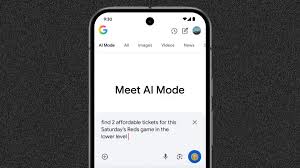Google AI mode is Here: chatbox seatch is changing the internet
Google AI
TECHNOLOGY & CRYPTO
7/1/20253 min read


Google AI Mode Is Here: Chatbot Search Is Changing the Internet
The digital landscape is undergoing a profound transformation with the official rollout of Google's new "AI Mode," a significant shift that is redefining how users interact with the internet. This isn't just an incremental update; it's a fundamental reimagining of the search experience, moving away from a traditional list of blue links towards a conversational, chatbot-like interface. Powered by a custom version of Google's Gemini generative AI model, AI Mode aims to provide more direct, synthesized answers and a deeper, more intelligent interaction with information.
The core of AI Mode lies in its ability to understand and respond to complex, multi-part queries in a natural, conversational manner. Unlike traditional search that relies heavily on keywords and matching web pages, AI Mode leverages advanced natural language processing to grasp user intent, even for nuanced or multi-faceted questions. This means users can ask questions in a way that feels more like talking to a human expert, rather than trying to craft perfect search terms. For example, instead of searching "best Father's Day gifts," a user might now ask, "What should I get my dad who loves Roman history and woodcraft?" and receive tailored, thoughtful ideas.
One of the key functionalities of AI Mode is its "query fan-out technique," which allows the AI to break down a single complex question into multiple sub-questions, processing them to deliver comprehensive answers. These answers are often presented with links to their sources, graphs for data-heavy queries, and even follow-up suggestions, creating a richer, more interactive experience. Beyond simple text responses, AI Mode is expanding to offer interactive recommendations for product searches, virtual try-on features for clothing, and the ability to generate real-time graphs for sports and finance data.
Furthermore, Google is poised to integrate AI Mode with other Google applications like Gmail and Calendar. This means that if a user asks for restaurant recommendations in a city they're visiting, AI Mode could factor in their flight confirmations or calendar events to personalize suggestions based on their itinerary. While users will have the option to disconnect this access to their personal apps, the direction is clear: Google is moving towards a more context-aware and personalized search experience that feels less like a search engine and more like a personal assistant.
The introduction of "Deep Search" functionality within AI Mode further highlights this shift. This feature will enable the AI to analyze hundreds of different search threads and utilize an AI reasoning model to provide in-depth, cited responses to complex questions within minutes. This represents a significant leap from traditional search, where users would typically need to sift through numerous articles and synthesize information themselves.
This transformation in search is a direct response to the broader impact of large language models (LLMs) on how people seek information online. Users are increasingly turning to AI chatbots for instant, conversational answers, bypassing traditional search results. While some industry experts, like Eugene Levin of Semrush, express skepticism that AI Mode will be the preferred method for every search query, they acknowledge its strength in handling complex, multi-layered questions that benefit from a conversational approach. The consensus seems to be that users will likely adopt a hybrid approach, utilizing AI Mode for more in-depth or conversational queries, and traditional search for quick facts or specific website lookups.
The advent of AI Mode has significant implications for publishers and the online advertising model. If AI systems can directly answer queries by summarizing content, it could potentially reduce traffic to external websites, impacting advertising revenue. However, Google suggests that "AI Overviews," a precursor to AI Mode's deeper integration, have led to higher-quality clicks for publishers. The industry will need to adapt to this evolving landscape, with an increased focus on optimizing content for AI-generated summaries and structured data.
Ultimately, Google's AI Mode marks a pivotal moment in the evolution of internet search. It represents a move beyond mere information retrieval to intelligent assistance, where the search engine acts as a knowledgeable conversational partner. While the full ramifications are still unfolding, it's clear that the age of chat-powered search is here, fundamentally changing how we discover and interact with information online.
